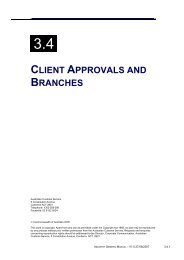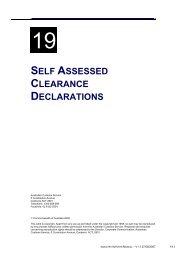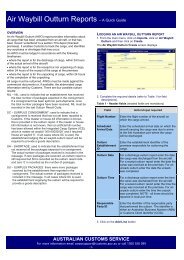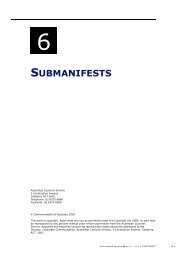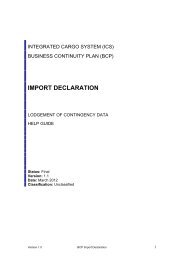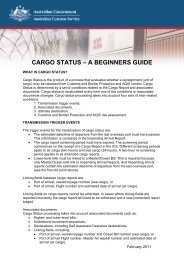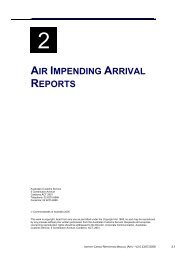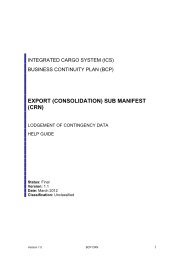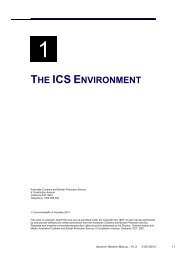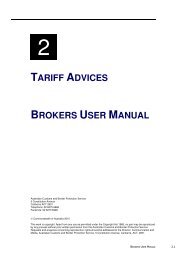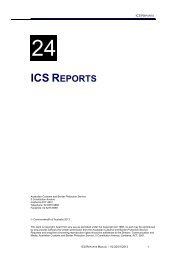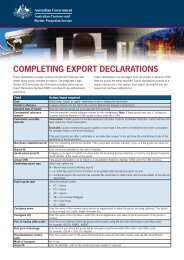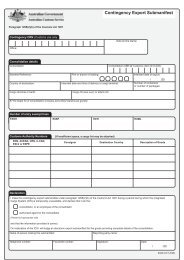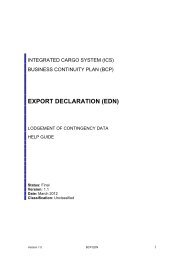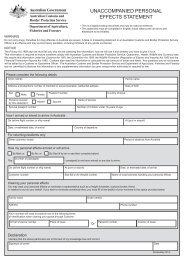Module 15 - Import Declarations Overview - Cargo Support
Module 15 - Import Declarations Overview - Cargo Support
Module 15 - Import Declarations Overview - Cargo Support
Create successful ePaper yourself
Turn your PDF publications into a flip-book with our unique Google optimized e-Paper software.
<strong>15</strong><br />
IMPORT DECLARATIONS<br />
OVERVIEW<br />
Australian Customs Service<br />
5 Constitution Avenue<br />
Canberra ACT 2601<br />
Telephone: 02 6275 6666<br />
Facsimile: 02 6275 6999<br />
© Commonwealth of Australia 2005<br />
This work is copyright. Apart from any use as permitted under the Copyright Act 1968, no part may be reproduced<br />
by any process without prior written permission from the Australian Customs Service. Requests and enquiries<br />
concerning reproduction rights should be addressed to the Director, Corporate Communication, Australian<br />
Customs Service, 5 Constitution Avenue, Canberra, ACT, 2601.<br />
INDUSTRY IMPORTS MANUAL – V1.1 27/08/2007 <strong>15</strong>.1
CONTENTS<br />
<strong>15</strong>.2 INDUSTRY IMPORTS MANUAL – V1.1 27/08/2007<br />
IMPORT DECLARATIONS OVERVIEW<br />
<strong>Overview</strong>...............................................................................................................3<br />
Declaration Nature Types .................................................................................3<br />
Lodging import declarations – process flow .........................................................5<br />
The Navigation Options Create Screen................................................................7<br />
Paid Under Protest ...............................................................................................9<br />
Amber Statement................................................................................................10<br />
Changes to AQIS requirements..........................................................................11<br />
Duty, Taxes and Charges...................................................................................12<br />
Customs Duty .................................................................................................12<br />
Taxes ..............................................................................................................12<br />
Cost Recovery Charges..................................................................................14<br />
Authority To Deal................................................................................................<strong>15</strong><br />
Document Status................................................................................................16<br />
Related Topics....................................................................................................18<br />
Further information .............................................................................................18
OVERVIEW<br />
IMPORT DECLARATIONS OVERVIEW<br />
Full import declarations (FIDs) are used by importers, or licensed brokers acting on<br />
their behalf, to clear goods from Customs control. FIDs may be used to clear<br />
goods in to the commerce of Australia (home consumption) or into a warehouse<br />
licensed by Customs.<br />
FIDs are required for all imported goods with a Customs value that exceeds the<br />
entry threshold as defined in Section 68 of the Customs Act (1901). At the time of<br />
publication the threshold value was $A1000.<br />
Other import documents may be required to clear specific types of goods from<br />
Customs control. These include:<br />
• Self Assessed Clearance (SAC) declarations - these declarations are used<br />
to clear air or sea cargo with a Customs value below the entry threshold.<br />
• Unaccompanied Personal Effects (UPE) statements - these statements<br />
apply to the personal belongings of individuals or families that have arrived<br />
as sea or air cargo before or after the owner has arrived in Australia. UPEs<br />
do not apply to tobacco products, alcoholic products, motor vehicles, or<br />
new goods purchased within the last 12 months.<br />
DECLARATION NATURE TYPES<br />
Nature 10<br />
Nature 10 import declarations are used for the entry of imported goods for home<br />
consumption (section 71A of the Customs Act 1901 refers).<br />
All duty and taxes must be paid on the goods declared on a Nature 10 import<br />
declaration before the goods will be cleared by Customs. If the importer is<br />
approved by the Australian Taxation Office (ATO) for the deferral of GST, the<br />
payment of any GST liability is not required at the time of importation of the goods.<br />
Refer to <strong>Module</strong> 16 <strong>Import</strong> <strong>Declarations</strong> Nature 10.<br />
Nature 20<br />
Nature 20 warehouse declarations are used for the entry of imported goods for<br />
warehousing (section 71A of the Customs Act 1901 refers).<br />
<strong>Import</strong>ed goods declared on a Nature 20 warehouse declaration do not require<br />
payment of duty or taxes until they are removed from the warehouse. Goods<br />
entered on a Nature 20 declaration must be stored in a warehouse licensed by<br />
INDUSTRY IMPORTS MANUAL – V1.1 27/08/2007 <strong>15</strong>.3
<strong>15</strong>.4 INDUSTRY IMPORTS MANUAL – V1.1 27/08/2007<br />
IMPORT DECLARATIONS OVERVIEW<br />
Customs (section 79 of the Customs Act 1901 refers). Refer to <strong>Module</strong> 17<br />
Warehouse <strong>Declarations</strong> Nature 20.<br />
Nature 10/20<br />
Nature 10/20 combined import/warehouse declarations are used in cases where a<br />
single consignment of goods contains items intended for entry into both home<br />
consumption and for warehousing. A Nature10/20 declaration offers the<br />
convenience of sending the required information to Customs and AQIS in a single<br />
electronic communication. Nature 10/20 declarations are treated as two separate<br />
declarations for cost recovery purposes. Refer to <strong>Module</strong> 16 <strong>Import</strong> <strong>Declarations</strong><br />
Nature 10.<br />
Nature 30<br />
Nature 30 ex-warehouse declarations are used in cases where goods are being<br />
entered into home consumption after the goods have been stored in a warehouse<br />
licensed by Customs (section 71A of the Customs Act 1901 refers).<br />
All duty and taxes must be paid on goods entered for home consumption on a<br />
Nature 30 ex-warehouse declaration before the goods will be cleared by Customs.<br />
If the importer is approved by the ATO for the deferral of GST, the payment of any<br />
GST liability is not required at the time of removal of the goods from the<br />
warehouse. Refer to <strong>Module</strong> 18 <strong>Import</strong> <strong>Declarations</strong> Nature 30.
IMPORT DECLARATIONS OVERVIEW<br />
LODGING IMPORT DECLARATIONS – PROCESS FLOW<br />
Creation of an import declaration involves three discrete processes:<br />
• save<br />
• submit<br />
• lodge<br />
Saving an import declaration<br />
When the Header section of a declaration is saved, a temporary identification<br />
number is assigned to that declaration. A saved declaration can be accessed for<br />
up to ten days, in order to add or amend information. If an import declaration is not<br />
lodged within ten days of the date it was originally saved, it will no longer be<br />
accessible and must be re-entered.<br />
Submitting an import declaration<br />
When an import declaration is submitted, it is processed in the system. At this<br />
stage, any applicable Community Protection questions are generated, along with<br />
lodgement questions.<br />
Lodging an import declaration<br />
The Community Protection and Lodgement Questions must be answered before<br />
an import declaration can be lodged. The declaration must be lodged the same<br />
day as it is submitted, otherwise it will need to be re-submitted in order to regenerate<br />
the lodgement questions.<br />
INDUSTRY IMPORTS MANUAL – V1.1 27/08/2007 <strong>15</strong>.5
<strong>15</strong>.6 INDUSTRY IMPORTS MANUAL – V1.1 27/08/2007<br />
IMPORT DECLARATIONS OVERVIEW<br />
The following diagram shows the process flow for saving, submitting and lodging<br />
an import declaration.
THE NAVIGATION OPTIONS CREATE SCREEN<br />
IMPORT DECLARATIONS OVERVIEW<br />
The first step in saving an import declaration is to create the import declaration<br />
‘header’.<br />
The header contains information common to the whole consignment.<br />
Once the header is saved a temporary identification number is generated and<br />
assigned by the Integrated <strong>Cargo</strong> System (ICS). The temporary identification<br />
number is used to locate an incomplete import declaration through the different<br />
steps of its creation until it is lodged and becomes an official document.<br />
The temporary identification number is retained by the ICS and remains valid for a<br />
period of ten days after the header was first saved. If the declaration is not lodged<br />
within this period a new declaration will have to be created.<br />
The <strong>Import</strong> Declaration Navigation Options Create screen displays at this stage.<br />
The Navigation Options Create screen enables users with the appropriate access<br />
to navigate through the creation options for an import declaration using a list of<br />
hyperlinks. At different stages of the process additional hyperlinks will be added to<br />
the display on the <strong>Import</strong> Declaration Navigation Options Create screen:<br />
• Header<br />
• Transport Details<br />
• Line Defaults<br />
• Tariff/AQIS lines<br />
• Errors (only if the declaration is submitted and errors exist)<br />
• Lodgement/Community Protection Questions (only if the declaration is<br />
submitted and no errors exist)<br />
• Duty, Taxes & Charges (displays once tariff/AQIS lines are entered, but only<br />
includes data after the declaration has been submitted).<br />
INDUSTRY IMPORTS MANUAL – V1.1 27/08/2007 <strong>15</strong>.7
<strong>15</strong>.8 INDUSTRY IMPORTS MANUAL – V1.1 27/08/2007<br />
IMPORT DECLARATIONS OVERVIEW<br />
The details for each section can be saved at any time. The All Mandatory<br />
Information Provided checkboxes are updated by the ICS as each section is<br />
completed. Once all of the mandatory information has been entered for each<br />
section, the import declaration can be submitted.<br />
Once a declaration has been submitted the ICS checks the information and any<br />
errors are returned to the importer. Errors must be corrected before the declaration<br />
is resubmitted.<br />
When all details are submitted correctly the ICS will return a ‘quote’ for duty, taxes<br />
and charges. This is accessible through the Duty, Taxes and Charges hyperlink.<br />
This quote is only valid until the end of the day on which it was created.<br />
The bold red text at the top of the screen indicates whether the import declaration<br />
is incomplete (not submitted) or submitted (not lodged).<br />
This diagram shows the relationship between the screens on an import<br />
declaration. This diagram will be displayed throughout this module to indicate the<br />
relevant part of the process.
PAID UNDER PROTEST<br />
IMPORT DECLARATIONS OVERVIEW<br />
An owner of goods or the licensed broker acting on behalf of an owner can<br />
endorse the entry of goods as Paid Under Protest (PUP) if they dispute the amount<br />
or rate of duty payable in respect of any goods, or the liability of any goods to duty<br />
(except duty imposed under the Customs Tariff (Anti-dumping) Act 1975). This<br />
endorsement must be accompanied by a description of the goods (where they are<br />
not the only goods on the declaration) and provide the grounds on which the<br />
protest is made.<br />
The duty must still be paid before the goods are released by Customs, the<br />
payment of duty under protest provides an opportunity for the owner/broker to<br />
apply for a review of Customs decision by the Administrative Appeals Tribunal<br />
(AAT). Application to the AAT must occur within six months of the original<br />
lodgement of the declaration. If the AAT agrees that incorrect duty has been<br />
applied, a refund of the duty amount under dispute will be made.<br />
For subsequent importation of like goods the importer/broker need not include the<br />
same paid under protest details but may instead refer to the import declaration<br />
where the PUP was first endorsed.<br />
Initial PUP endorsements automatically cause the import documents to be red<br />
lined, however automatic red lining of subsequent import declarations may not<br />
occur.<br />
Tip: GST, WET and LCT cannot be paid under protest as they are not duties<br />
within the meaning of the Customs Act 1901. Paid under protest does not apply to<br />
Nature 20 warehouse declarations.<br />
INDUSTRY IMPORTS MANUAL – V1.1 27/08/2007 <strong>15</strong>.9
AMBER STATEMENT<br />
<strong>15</strong>.10 INDUSTRY IMPORTS MANUAL – V1.1 27/08/2007<br />
IMPORT DECLARATIONS OVERVIEW<br />
During the compilation of a declaration, the importer or the Customs Broker acting<br />
on their behalf may indicate that they have a genuine uncertainty as to the<br />
accuracy of some of the information used in the preparation of the declaration.<br />
The importer/broker must specify any amber reason/s for the header and/or the<br />
line of the declaration and complete the associated amber statement. The amber<br />
statement allows the importer/broker to clearly state the details of their concern.<br />
The amber statement should include the following:<br />
• a statement that the person making the declaration is uncertain about<br />
information in the declaration and considers that as a result of including that<br />
information, the declaration might be false or misleading (or a statement that<br />
the person is uncertain whether as a result of omitting information from the<br />
declaration, the declaration might be false or misleading)<br />
• identification of the information in question (or the omission of information)<br />
• reasons for the uncertainty about the information (or the effect of omitting the<br />
information).<br />
The amber statement does not provide automatic exemption from a penalty for<br />
making a false or misleading statement to Customs. Additionally, the provision of<br />
an authority to deal after verifying the particulars of an amber line entry does not<br />
guarantee the criteria in the legislation have been met in order to avoid a penalty.<br />
Amber statements automatically set import declaration status to hold. Customs can<br />
request further documentation or arrange for the goods to be examined before<br />
providing an authority to deal.
CHANGES TO AQIS REQUIREMENTS<br />
IMPORT DECLARATIONS OVERVIEW<br />
A range of quarantine changes will be introduced to industry under the import<br />
component of <strong>Cargo</strong> Management Re-engineering (CMR).<br />
To help you understand these changes Australian Quarantine and Inspection<br />
Service (AQIS) has developed an information booklet explaining the new reporting<br />
and operating requirements.<br />
To view the AQIS CMR (<strong>Import</strong>s) Information booklet go to www.aqis.gov.au and<br />
follow the links from 'Hot Topics at AQIS' to the CMR page.<br />
COMMUNITY PROTECTION<br />
The ICS generates Community Protection (CP) and lodgement questions which<br />
must be answered prior to lodgement of the import declaration. In particular, CP<br />
questions and provisions:<br />
• advise importers/brokers of particular additional Customs and AQIS information<br />
requirements for CP issues<br />
• ensure required CP information is provided<br />
• enable selection of certain import transactions for scrutiny by Customs and/or<br />
AQIS.<br />
Once community protection and lodgement questions have been answered, the<br />
declaration can be saved without lodging it. The import declaration does not<br />
become an official document, however, until it is lodged.<br />
INDUSTRY IMPORTS MANUAL – V1.1 27/08/2007 <strong>15</strong>.11
DUTY, TAXES AND CHARGES<br />
CUSTOMS DUTY<br />
<strong>15</strong>.12 INDUSTRY IMPORTS MANUAL – V1.1 27/08/2007<br />
IMPORT DECLARATIONS OVERVIEW<br />
Goods entering Australia can attract Customs duty. Customs duty rates vary and<br />
depend on a number of factors, such as type of goods and country of origin. Rates<br />
of duty payable by an importer are determined by the classification of goods within<br />
the Customs Tariff Act 1995. In some circumstances, anti-dumping or<br />
countervailing measures, which result in the imposition of additional rates of duty,<br />
may also apply.<br />
TAXES<br />
In addition to collecting duty on imported goods and cost recovery charges,<br />
Customs also collects tax on behalf of the Australian Tax Office (ATO) including:<br />
• Goods and Services Tax (GST)<br />
• Luxury Car Tax (LCT)<br />
• Wine Equalisation Tax (WET).<br />
GST<br />
Customs is responsible for calculating and collecting GST on imported goods and<br />
for administering all matters concerning taxable importations. Generally, GST is<br />
charged at the time of importation. Warehoused goods are not liable for GST until<br />
they are entered for home consumption.<br />
The amount of GST (the current rate of GST is 10%) is calculated on the Value of<br />
the Taxable <strong>Import</strong>ation (VoTI). VoTI is calculated by the ICS using information<br />
provided in the relevant declaration document. The VoTI is the sum of:<br />
• the Customs value of the imported goods<br />
• the amount paid or payable:<br />
o for the international transport of the goods to their place of consignment<br />
in Australia<br />
o to insure the goods for that transport<br />
• the amounts relating to transport and insurance that are not already included in<br />
the Customs value<br />
• any Customs duty payable in respect of the importation of the goods<br />
• any WET payable in respect of the local entry of the goods.
IMPORT DECLARATIONS OVERVIEW<br />
The ATO operates a scheme that provides for the deferral of GST on imported<br />
goods. The deferred GST scheme covers GST only; it does not impact upon<br />
Customs duty, which must still be paid at the time of importation. Deferral of GST<br />
on imported goods extends to all importations that are entered for home<br />
consumption, either at the time of importation (Nature 10 import declarations) or<br />
from a warehouse licensed by Customs (Nature 30 import declarations).<br />
<strong>Import</strong>ers must apply to and be registered by the ATO to participate in the deferred<br />
GST scheme. Goods in the following categories are excluded from the scheme:<br />
• goods imported under the TRADEX scheme that are diverted into home<br />
consumption. (Schedule 4, Item 21A of the Customs Tariff Act (1995) refers –<br />
this provides an exemption from Customs duty and GST where <strong>Import</strong>s are<br />
integrated into goods that are subsequently exported within 12 months. Goods<br />
that are not exported or that are dealt with contrary to TRADEX requirements<br />
will have GST imposed upon them by way of adjustment.)<br />
• low-value imports not entered for home consumption<br />
• goods imported temporarily under Customs Act 1901 s162 or s162A.<br />
<strong>Import</strong>ers not admitted to the scheme are required to pay GST and duty at the time<br />
the goods are entered for home consumption or otherwise dealt with under the<br />
Customs Act 1901.<br />
<strong>Import</strong>s from external territories into Australia are treated as taxable importation for<br />
the purposes of GST. External territories include:<br />
• Ashmore and Cartier Islands<br />
• Christmas Island<br />
• Cocos (Keeling) Islands<br />
• Coral Sea Islands<br />
• Norfolk Island<br />
• Heard and McDonald Islands<br />
• Willis Island<br />
• Australian Antarctic Territory.<br />
GST is levied under A New Tax System (Goods and Services Tax) Act 1999.<br />
INDUSTRY IMPORTS MANUAL – V1.1 27/08/2007 <strong>15</strong>.13
LCT<br />
<strong>15</strong>.14 INDUSTRY IMPORTS MANUAL – V1.1 27/08/2007<br />
IMPORT DECLARATIONS OVERVIEW<br />
Luxury Car Tax (LCT) is payable on motor vehicles that have a luxury car tax value<br />
that exceeds the luxury car tax threshold. This threshold is re-set by the ATO each<br />
financial year. LCT is collected by Customs at the time of importation unless an<br />
exemption exists or the importer is entitled to postpone the payment, until a later<br />
sale occurs, by quoting their ABN. LCT is calculated by the ICS.<br />
WET<br />
Wine Equalisation Tax (WET) is payable on imported wine at the time of<br />
importation unless an exemption exists or the importer is entitled to postpone the<br />
payment by quoting their ABN.<br />
COST RECOVERY CHARGES<br />
In the past, the Customs cost recovery system was based on a ‘one size fits all’<br />
approach with a complicated system of charges that artificially differentiated<br />
between sea, air and post modes of transport. A new cost recovery system has<br />
been introduced under <strong>Cargo</strong> Management Re-engineering (CMR), which:<br />
• streamlines the existing processes<br />
• removes the differentiation between the cost of transactions across different<br />
modes of transport<br />
• focuses on the declaration of the goods imported, and<br />
• encourages electronic lodgement with a substantial cost saving.<br />
The CMR cost recovery system ensures that Customs charging regime is<br />
reasonable and transparent and provides certainty of costs.<br />
For more information on cost recovery charges, refer to http://www.customs.gov.au
AUTHORITY TO DEAL<br />
IMPORT DECLARATIONS OVERVIEW<br />
Goods are available to importers once payment of applicable duty, taxes and<br />
charges has been made and an authority to deal has been issued.<br />
Customs will send the importer an authority to enter the goods into home<br />
consumption or warehousing (sections 71C and 71D of the Customs Act 1901<br />
refer respectively). Authority to deal occurs once all impediments to either the<br />
goods or the import documents have been resolved and all duty, taxes and<br />
charges have been paid. An authority to deal is generated by the ICS when the<br />
status of both the import declaration and the cargo report) are set to ‘clear’ by<br />
AQIS and Customs.<br />
Any impediment to the documentary entry of goods prevents the importation from<br />
being cleared. When an impediment exists (eg, the goods are red line) the status<br />
is set to ‘hold’. Held goods may require a physical examination or documentary<br />
check. <strong>Declarations</strong> with a ‘Held’ status are also known as ‘red line’ declarations<br />
<strong>Declarations</strong> can go ‘red line’ for a number of reasons. Some of these reasons<br />
include:<br />
• community protection checks (depending on the answers to the CP Questions<br />
and other CP risk criteria)<br />
• paid under protest payments on duty (when duty payment is first endorsed as<br />
paid under protest)<br />
• a risk assessment profile being triggered.<br />
INDUSTRY IMPORTS MANUAL – V1.1 27/08/2007 <strong>15</strong>.<strong>15</strong>
DOCUMENT STATUS<br />
<strong>15</strong>.16 INDUSTRY IMPORTS MANUAL – V1.1 27/08/2007<br />
IMPORT DECLARATIONS OVERVIEW<br />
The document status for the declaration will be shown below the title bar for each<br />
declaration screen or on the Navigation Options View screen.<br />
This screenshot shows an import declaration with a document status of ‘Clear’<br />
This screen shot shows an import declaration with a document status of<br />
‘Withdrawn’.<br />
The document status of a declaration may be one of the following:
IMPORT DECLARATIONS OVERVIEW<br />
• INCOMPLETE * - a declaration has been created or amended. The new<br />
declaration, or in the case of an amended declaration the latest version of<br />
the declaration, has not yet been submitted or lodged. This status only<br />
applies in the Customs Interactive. (CI).<br />
• SUBMITTED* – a declaration, or in the case of an amendment the latest<br />
version of a declaration, has been submitted but not yet lodged. This status<br />
only applies in the Customs Interactive (CI).<br />
• CLEAR– a declaration has been lodged but duty, taxes and charges have<br />
not yet been paid. No additional impediments to the release of the cargo<br />
apply. This status applies in both the Customs Interactive (CI) and EDI<br />
(Electronic Data Interface) environments.<br />
• HELD - a declaration has been lodged but duty, taxes and charges have<br />
not yet been paid. Additional impediments apply to the release of this<br />
cargo. This status applies in both the Customs Interactive (CI) and EDI<br />
(Electronic Data Interface) environments.<br />
• FINALISED – a declaration is clear and duty, taxes and charges have been<br />
paid. This status applies in both the Customs Interactive (CI) and EDI<br />
(Electronic Data Interface) environments.<br />
• WITHDRAWN* – a declaration that was previously lodged has been<br />
withdrawn. <strong>Import</strong> declarations can be amended or withdrawn after they<br />
have been lodged under specified circumstances 1 . This status applies in<br />
both the Customs Interactive (CI) and EDI (Electronic Data Interface)<br />
environments.<br />
Note: A document status of INCOMPLETE, SUBMITTED, WITHDRAWN and<br />
DEMAND will be displayed in bold red text across the top centre of the declaration<br />
view screens. The status of CLEAR, HELD or FINALISED will be displayed in the<br />
Document Status field on the right hand side of the Navigation Options screen as<br />
well as on the <strong>Import</strong> Document Status Summary View and Detail View screens.<br />
Consolidated status of a consignment, incorporating both declaration and cargo<br />
report status information from Customs and AQIS may be accessed through the<br />
Status hyperlink on the Transport Details section of the declaration. For further<br />
details on Consolidated document status, refer to <strong>Module</strong> 1 - <strong>Import</strong> <strong>Cargo</strong><br />
Reporting – An <strong>Overview</strong>, Page 1.23.<br />
1 Customs Act 1901, Section 71F.<br />
INDUSTRY IMPORTS MANUAL – V1.1 27/08/2007 <strong>15</strong>.17
RELATED TOPICS<br />
<strong>15</strong>.18 INDUSTRY IMPORTS MANUAL – V1.1 27/08/2007<br />
IMPORT DECLARATIONS OVERVIEW<br />
For more information on Nature 10 <strong>Import</strong> <strong>Declarations</strong>, refer to <strong>Module</strong> 16.<br />
For more information on Nature 20 Warehouse <strong>Declarations</strong>, refer to <strong>Module</strong> 17.<br />
For more information on Nature 30 <strong>Import</strong> <strong>Declarations</strong>, refer to <strong>Module</strong> 18.<br />
For more information on Self Assessed Clearance <strong>Declarations</strong>, refer to <strong>Module</strong><br />
19.<br />
For more information on Payments, refer to <strong>Module</strong> 20.<br />
For more information on S71E Movement Applications, refer to <strong>Module</strong> 21.<br />
For more information on Unaccompanied Personal Effects, refer to <strong>Module</strong> 22.<br />
For more information on Drawbacks, refer to <strong>Module</strong> 23.<br />
FURTHER INFORMATION<br />
For import-related technical support email cargosupport@customs.gov.au or<br />
phone 1300 558 099.<br />
For information about GST, LCT and WET, contact the Australian Tax Office on<br />
13 28 66.<br />
For AQIS information go to www.aqis.gov.au and follow the links from HOT<br />
TOPICS.



